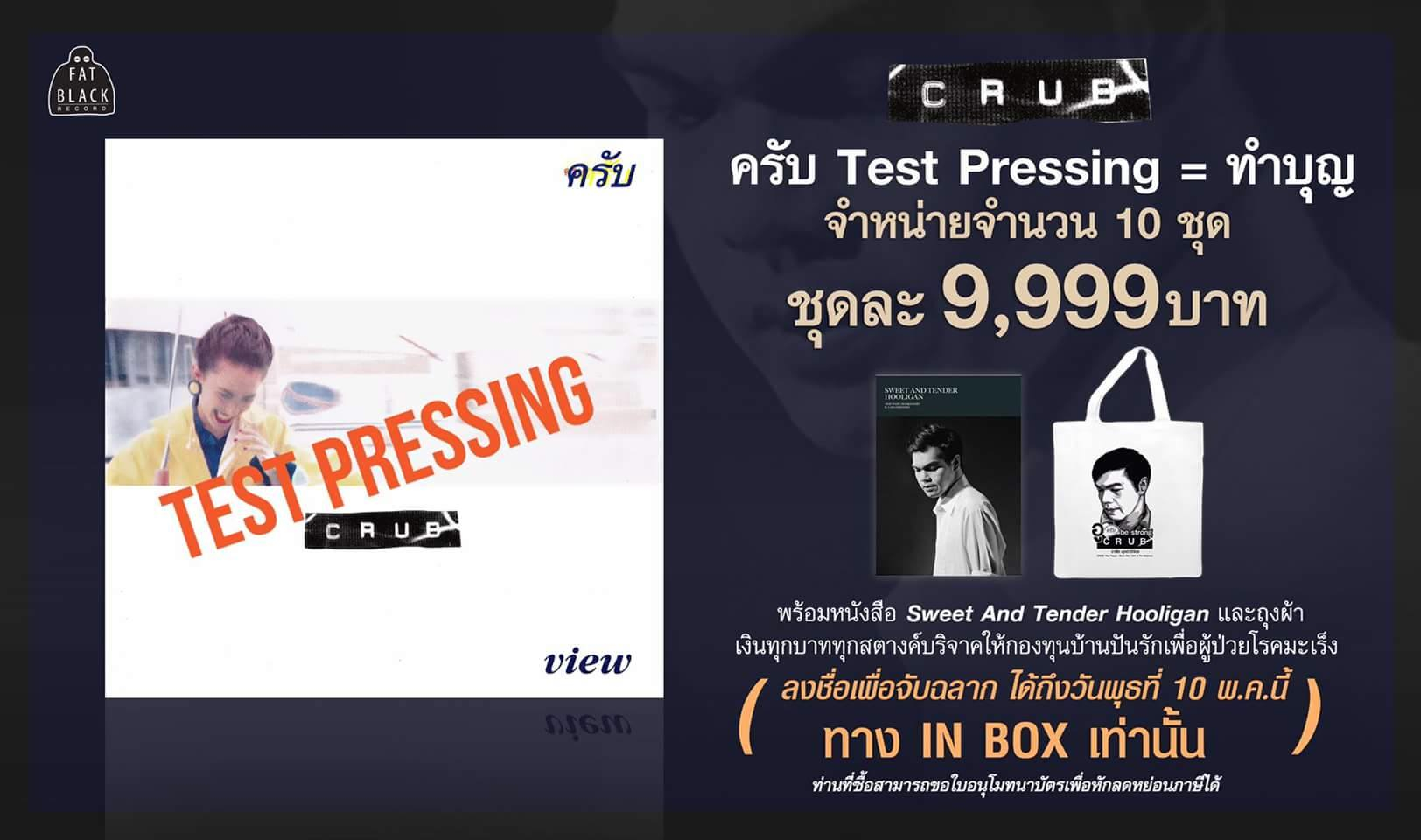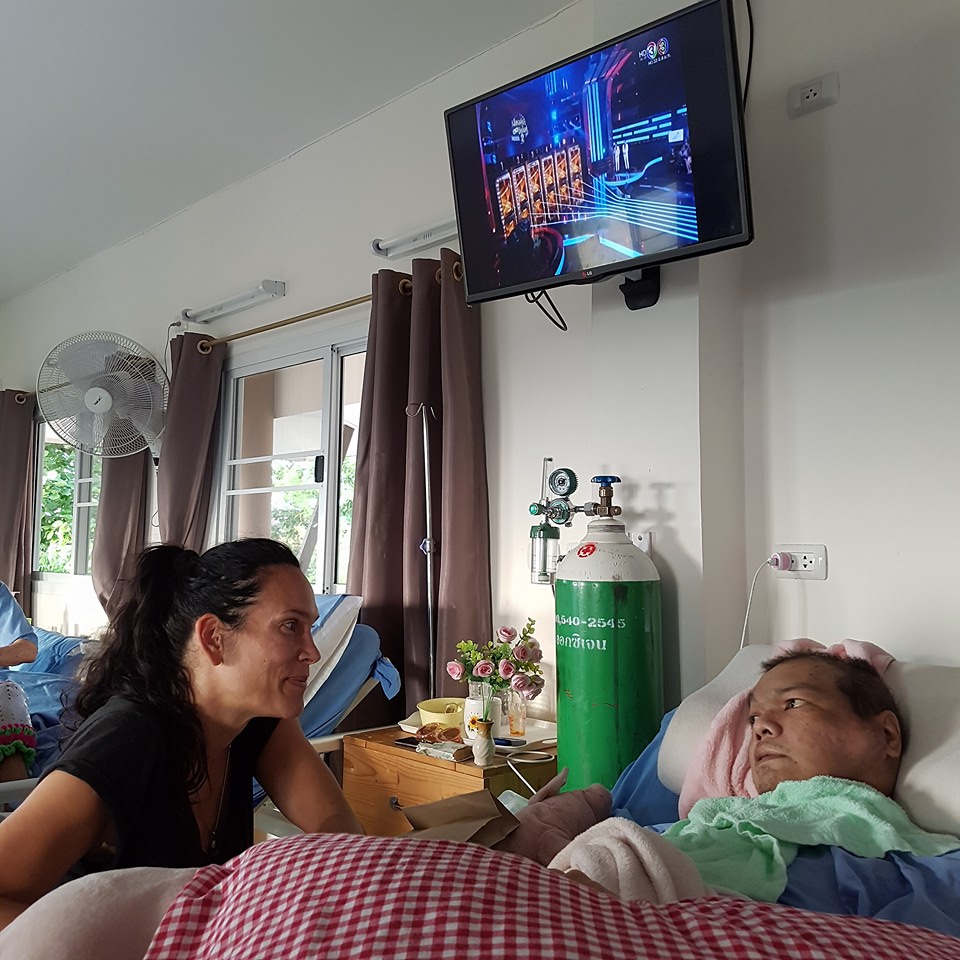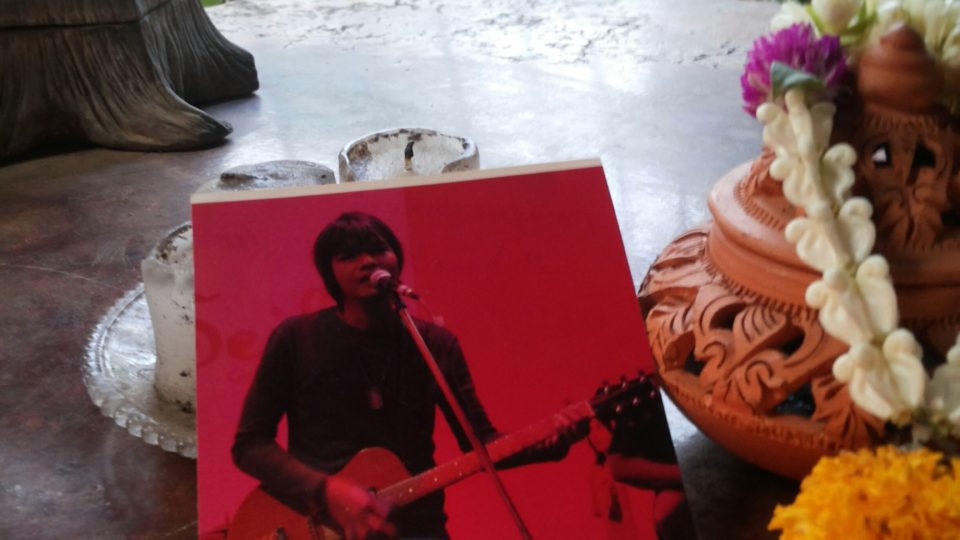At Thai funerals, the deceased are not only honored, but treated as revered guests. Family and friends gather each night at the temple, beside the coffin and the person’s portrait, monks chant, and loved ones offer food, drink, and solace to the person’s spirit, which is believed to linger on this earthly plane until the body is cremated. Another important date is the first anniversary of their death.

For the passing of Thai indie rock stalwart Wasit “Ooh” Mukdavijitr last year, his kin put a musical spin on this tradition. A friend setting up a turntable next to the coffin to play Ooh’s favorite records by The Smiths, David Bowie, The Clash, and Leonard Cohen.
The ceremony to mark the first anniversary of his passing will take place on Sunday, June 4, at Wat Lat Bua Khao in Bangkok, where his ashes are interred. This will be a more solemn ceremony, with family, friends, and a few fans offering food to the monks in his honor. The ritual will begin at 9:30am.
Despite his premature passing at the age of 47 to cancer, his specter continues to hover over the realm of Thai indie rock, which he helped galvanize as the singer and main songwriter of the band Crub. Released in 1994, the group’s debut album, View, has been hailed as the first full-length record of Thai alternative rock.
The album’s staying power was loudly attested to earlier this year when a white vinyl version of View, released by Cat Radio at its annual alternative music festival, sold out in two days. The country’s only alternative radio station marketed the album as “Thailand’s Brit Pop Pioneer.” Retailing for THB9,999 (about $292), 10 test pressings of View, along with a tote bag featuring Ooh’s face and a new biography of him, Sweet and Tender Hooligan, written by his girlfriend, Lasa Sakdadej, sold out within a few hours of being announced on Facebook. All the proceeds from the latter sale were donated to the Baanpabrak Suratthani Foundation, which provides palliative care for cancer-stricken patients without means.

Crub’s only album, like many debut records, is a patchwork of different influences, except that the musical references they were riffing on, like The Jam, The Stone Roses and Echo and the Bunnymen, had rarely ever been heard in Southeast Asia at that time. What would further distinguish them from the herd of hopefuls waiting in the wings to try and upstage them was Wasit’s ability to write and sing in the most eloquent English.
I was lucky enough to meet Wasit many times during his career and develop a close friendship with him. During our first encounter in the offices of an alternative music and fashion magazine called Hyper just after he started Crub, I was struck by how he spoke English with a Cockney accent and used British slang terms that he’d picked up from albums and a couple of ex-girlfriends.

As bad luck or poor timing would have it, just as Crub was splintering, Modern Dog was unleashing their first album. Possessing stagecraft beyond their peers, Modern Dog put on a wild show opening for Radiohead in a hall above MBK mall in late 1994, quickly establishing themselves as Thailand’s premier alt-rock outfit, a title they have never relinquished.
Next on Wasit’s musical journey came the band Day Tripper. Formed with lead guitarist and sometimes singer Tuantong “Tuan” Niyomchart, the band went on to make three highly regarded albums. The second record, to my ears anyway, sounds like Wasit’s magnum opus. Snidely entitled Pop Music (“I like pop music” is a cliché among Thais learning English), this is an album that leaps genres, skirts boundary lines and defies pigeonholing by wandering all over the musical map, from low-key ballads sung in Thai to lo-fi noise rock in the vein of Pavement, to spoken word poems in English recited over guitar feedback. There is a Brit-pop stomper called “End of the Day,” and an eerie acoustic tune entitled “Death Star,” which Wasit said was spawned by his encounter with a ghost on the beach in Koh Chang or, as he conceded with a laugh, “To be honest, dunno really. I was bloody well pissed, wasn’t I?”
That album fared no better than their third release, their major-label debut. Relying a little too heavily on the ear-candy ballads that make the Thai pop charts into more of a sweet shop than a hit parade, the self-titled third album also failed to find a mass audience. Dropped by Grammy Entertainment, Day Tripper hit a dead end.
Like a lot of musical pioneers, Wasit never reaped much in the way of financial rewards for his efforts, but music ran too deeply in his bloodline for him to ever consider quitting. His mother, Saowanee Rattanataya, studied opera at Chulalongkorn University and performed in public as a soprano, whereas his father sang Elvis songs at family karaoke sessions. Since his mom gave in to family pressure to give up her musical career and spent much of her life (cut short by leukemia in 1999) with the ground crew for Thai Airways, she was encouraging of her son’s aspirations, giving him his first alternative rock album, the debut by Aztec Camera, High Land, Hard Rain, which would be one of the musical compasses that guided the future direction of his music.

In 2011, he released what was essentially a solo album under the name Ooh and the Ballyhoo, on which his Beatles and Smiths roots still showed, then formed Blue’s Bar (named after a long-gone, alt-rock lair on Langsuan Road) with guitarist and producer Prawetch Nopnirapath. That project yielded one album of more straight-up alternative fare.
That was the final entry in his discography, but it was not the last chapter in his story. That tragic turn of events began in early 2015, with the diagnosis of Stage 4 lung cancer. Then came the chemo and radiation treatments, then the desperate measures that included meditation retreats and his girlfriend ordaining as a Buddhist nun. Through all these upheavals and setbacks, he bore the brunt of his illness with the same stoic determination with which he faced the disappointments of the music business, finding solace in songs like Death with Dignity by Sufjan Stevens, which he posted on his Facebook page repeatedly over the last year of his life.
Any time we visited him in the hospital, and then in the palliative care center a week before his passing, he insisted that he was fine, that he didn’t need anything.

On what turned out to be the final visit, I asked Lasa if he had any last requests. She said that, in the delirium caused by the painkillers, he kept babbling about leaving the hospital to go shopping for vinyl at an indie record store. By then, the cancer had eaten into his spine and rendered his legs useless, so that simple wish had become an impossible dream.

When she asked me to contribute the only English-language part of his biography, which is on sale at the indie music shops, Nong Taphrachan and Fat Black Records, for THB250, I recalled that he is the only man in my adult life who has ever given me a Valentine’s Day card — actually a postcard with a cartoon of an alien smoking a joint on the front next to the line “Lost It In Space.” On the back, he had scribbled some lines from William Burroughs’ novel Naked Lunch — “Rock and roll adolescent hoodlums storm the streets of all nations. They burst into the Louvre and throw acid in the Mona Lisa’s face” — and said that he had never had a real brother but thought of me as his “spiritual brother,” signing it off with, “Your punky lil bro.”
While working on that tribute, I decided to dedicate my new book, On the Night Joey Ramone Died: Tales of Rock and Punk from Bangkok, New York, Cambodia and Norway, to him for being “a cornerstone of Thai indie rock and a dear old friend.” But that inscription could hardly convey the breadth of his career and our 20-year friendship.
To frame the tribute in his biography, I tried to document his last performance, which took place at the Rock Against Cancer benefit on March 13, 2016, in Bangkok. Crippled by cancer and bloated by chemotherapy, he somehow summoned the strength to get on stage one last time with the help of a cane. Mind you, no one was expecting him to look or sing like he did in his heyday. We all knew the toxic war that this self-proclaimed “cancer warrior” had been fighting. Most of us were just happy to see him again, and see him in high spirits no less, reunited with Tuan, the lead guitarist of Day Tripper, to play a rendition of their biggest hit, with the crowd sharing the vocal duties.
For a swan-song performance, he could not have bowed out on a higher or more heroic note, basking in the adulation of the crowd and some of the younger musicians he had inspired, giving heartfelt thanks in both Thai and English to all his old friends, even pausing to smile and laugh when someone yelled, “Ooh, don’t die!”
Thanks to videographer Ratthapoom WPD, that performance has been immortalized on Youtube:
Since I still owe him a Valentine’s Day card. If I could, I’d sign this: “With gratitude, respect and brotherly love from your punky old bro.”





Reader Interactions